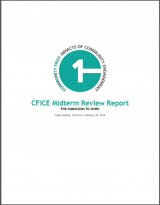Have your say. Take our survey!
Have you heard? CFICE is making some exciting new changes! As was proposed in our initial SSHRC application, CFICE is getting ready to transition to Phase II of our work. In order to transition smoothly, we want to hear from YOU regarding how you might want to be involved in CFICE, what kinds of content you want CFICE to create, and more.
Please fill out our online survey to provide your feedback. The survey should only take about 10 – 15 minutes to complete.

Want more information about the transition first? Scroll down or check out CFICE’s Midterm Review Report!
CFICE Transition Background Information
1. What is CFICE?
Community First: Impacts of Community Engagement, is an action research project aimed at strengthening Canadian communities by asking the question: How can community campus partnerships be designed and implemented to maximize the value created for non-profit, community-based organizations?
Co-directed by Carleton University and the Canadian Alliance for Community-Service Learning, the project operates under the guidance of a project Steering Committee and Program Committee (made up of the hub co-leads and CFICE co-directors), and with the support of a Secretariat that is housed at the Carleton Centre for Community Innovation.
Find out more about CFICE by visiting our About page!
2. Phase I of CFICE
During the first phase of the project, the team has focused on critically examining the obstacles to, and strategies for, optimizing the community impacts of community-campus engagement (CCE) in four thematic policy areas. The structure of the project team during this phase has consisted of five autonomously-operating “hubs”, each of which has been led by a community and an academic co-lead:
- Poverty Reduction, co-led by the Vibrant Communities network;
- Community Food Security, co-led by Food Secure Canada in cooperation with the Canadian Association of Food Studies;
- Community Environmental Sustainability, co-led by Trent Community Research Centre;
- Violence Against Women, co-led by the Canadian Association of Elizabeth Fry Societies;
- Knowledge Mobilization, co-led by the Canadian Alliance for Community-Service Learning.
Each hub has been responsible for collecting CCE data through the development and implementation of community-driven demonstration projects. The Knowledge Mobilization hub has played a unique role in the project in that it has both organized and managed its own demo projects while at the same time provided key knowledge mobilization services to the project as a whole.
Find out more about Phase I by visiting our Sector-Specific Work page. Or read CFICE’s Midterm Review Report!
3. Phase II of CFICE
While the focus of the project in Phase I has primarily been on collecting data and completing project research, the project is now moving into Phase II (official start: April 1, 2016). This phase will focus on mobilizing the knowledge and findings gained from Phase I, with the goal of influencing (and changing) the CCE policies, practices, and systems of post-secondary institutions (PSIs), funders, and community organizations for more effective, value-generating community-campus partnerships (CCPs) for community-based organizations.
The CFICE Program Committee (PC) has proposed to complete Phase II work through four policy-oriented working groups (outlined in brief below).
The transition to Phase II is underway. Each working group is expected to develop an initial work plan for phase II by June 2016.
Find out more about Phase II by visiting our Cross-Sector Work page. Or read CFICE’s Midterm Review Report!
4. Phase II Working Groups
4.1 Aligning Institutions for Community Impact
The Aligning Institutions for Community Impacts working group (WG) seeks to addresses barriers to effective community-campus engagement (CCE) at post-secondary institutions (PSIs), community-based organizations (CBOs), and funding agencies (including governmental bodies and private foundations). A few pilot projects at the provincial and national level are currently under consideration for the work of this WG and their pursuit will be supported by both the sector-specific learnings and a thorough environment scan. These projects may include:
- Adapting the Carnegie Foundation’s Community Engagement Classification system to a Canadian and community-first context to assess institutional changes required for improved community-first, community-campus engagement (CCE) work
- Developing a network of campus engagement offices for supporting nation-wide discussions around implementing institutional programs and policy change (e.g. developing a Community Fellow in Residence program, or foundation-supported student stipends for CCE; higher-level discussions around PSI leadership for community impact)
- Completing an evaluation of the current state of CSL programs in Canadian PSIs
Patricia Ballamingie, Associate Professor at Carleton University, is the interim academic co-lead of this working group.
Find out more about the Aligning Institutions for Community Impact working group.
4.2 Community-First Partnership Tools
The Community First Partnership Tools working group (WG) intends to identify, and if not available, develop, community-campus partnership tools and supports that incorporate a ‘community first’ perspective. In keeping with CFICE’s ethos, we will continue to develop and refine these tools collaboratively with our community-based partners. Projects that may be pursued by this WG include:
- Developing a community-first CCE policy handbook for use by campuses and communities (might also include training modules for students, faculty, and community-based organizations (CBOs))
- Working with CBOs to develop evaluation tools to help CBOs determine if a CCE partnership is working, and to assess the CBO’s preparedness for engaging in a research partnership with an academic institution
- Piloting a sustainable model for recruiting and retaining graduate students in long term community-based research projects, including establishing pathways from undergraduate to graduate programs, designing and testing mentorship models for CCE, etc.
Natasha Pei, Community Animator at Vibrant Communities, John Marris, Executive Director of the Trent Community Research Centre, and Stephen Hill, Associate Professor at Trent University, are the interim co-leads of this working group.
Find out more about our Community-First Partnership Tools working group.
4.3 Community-Campus Engagement (CCE) Brokering
The Community-Campus Engagement (CCE) Brokering working group (WG) seeks to understand how existing brokerage models, like the Trent Community Research Centre, work. This research will allow the WG to identify best practices for establishing and maintaining productive community-first CCE partnerships. With this knowledge, the CCE Brokering WG will support the development of two community-driven pilot projects:
- A Pan-Canadian food sovereignty brokerage platform driven by key CFICE partners, including FSC/RAD, the CAFS/ ACÉA, Meal Exchange, and Volunteer Alberta
- A multi-sector Ottawa brokerage platform to streamline the CCE work of the various community and campus institutions in Ottawa (led by the Ottawa Eco-Talent Network)
In the CFICE context, a brokerage mechanism is an organization, person, tool, platform, etc. that helps connect and support relationship development between community groups and academics.
Amanda Sheedy, Director of Development and Engagement at Food Secure Canada, Charles Levkoe, Adjunct Research Professor at Carleton University, Jason Garlough, Executive Director of the Ottawa Eco-Talent Network, and Bessa Whitmore, Professor Emerita at Carleton University are the interim co-leads of this working group.
Find out more about our Community-Campus Engagement Brokering working group.
4.4 CFICE Evaluation and Analysis
The Evaluation and Analysis (EA) working group’s (WG) role is to support the evaluation efforts of the CFICE project. This WG seeks to:
- Inform the activities of other working groups by facilitating a robust analysis and dissemination of Phase I & II results and lessons
- Identify key (human) resources for assisting with the evaluation activities of the WGs and continuing hubs
- Support new and existing project members in cross-project evaluation and evaluation-related knowledge mobilization activities
- Develop protocols for working with (marginalized) communities (based on existing research, including lessons from protocols developed between researchers and Indigenous communities)
Peter Andrée, Associate Professor at Carleton University, is the interim academic co-lead of this working group.
Find out more about our Evaluation and Analysis working group.
